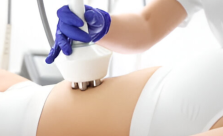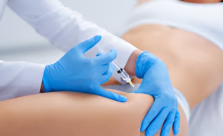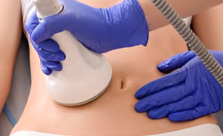If you’re preparing for a Skinny BBL, you may be wondering what kind of pre-operative lab work you’ll need before surgery. Lab testing is a standard part of the pre-surgical process, helping to ensure your safety and optimize your results.
What pre-operative lab tests are required before a Skinny BBL?
Most patients will need a basic metabolic panel, complete blood count (CBC), blood glucose test, coagulation profile, and possibly a urinalysis — depending on medical history and surgeon protocol.
Let’s explore the most common pre-op lab tests , why they’re important, and how they help your certified plastic surgeon ensure a safe and successful procedure.
Why Pre-Op Lab Tests Are Required
Before any surgical procedure — including a Brazilian Butt Lift for slim women and petite body types — your surgeon must confirm that you are medically fit for surgery . These tests help identify any hidden health issues that could increase your risk of complications, such as:
- Poor wound healing
- Excessive bleeding
- Adverse reactions to anesthesia
- Infection
Lab tests also help your anesthesiologist tailor the safest approach for your body.
Common Pre-Op Lab Tests for a Skinny BBL
While the exact tests may vary depending on your age, medical history, and overall health , here are the most commonly required pre-op lab tests before a Skinny BBL :
1. Complete Blood Count (CBC)
- What it checks : Red blood cells, white blood cells, hemoglobin, and platelets
- Why it’s important : Ensures you’re not anemic and have a healthy immune system to support healing
2. Basic Metabolic Panel (BMP)
- What it checks : Electrolyte levels, kidney function, blood sugar levels, and acid-base balance
- Why it’s important : Helps assess your body’s readiness for surgery and anesthesia
3. Coagulation Panel (PT/INR and PTT)
- What it checks : Blood clotting ability
- Why it’s important : Identifies clotting disorders or risks of excessive bleeding during or after surgery
4. Blood Glucose or HbA1c (for Diabetic or Prediabetic Patients)
- What it checks : Blood sugar levels or long-term glucose control
- Why it’s important : Poorly controlled diabetes can impair healing and increase infection risk
5. Urinalysis
- What it checks : Signs of infection, kidney function, or drug use
- Why it’s important : Helps rule out urinary tract infections and assesses overall hydration and kidney health
6. Pregnancy Test (if applicable)
- What it checks : Whether you are pregnant
- Why it’s important : Surgery and anesthesia can pose risks to a developing fetus; most surgeons require a negative test for women of childbearing age
7. Electrocardiogram (EKG or ECG) (for select patients)
- What it checks : Heart rhythm and electrical activity
- Why it’s important : May be required for patients with a history of heart issues, high blood pressure, or patients over the age of 40
Additional Tests Based on Medical History
Your surgeon may request additional tests if you have:
- A history of heart disease
- Hypertension
- Autoimmune disorders
- Liver or kidney disease
- Thyroid conditions
- Medication use that affects blood clotting (like blood thinners)
These may include:
- Liver function tests
- Thyroid panel
- HIV or Hepatitis screening (in some cases)
- Drug screening (if required by the surgical facility)
How to Prepare for Your Pre-Op Lab Work
Here’s what you should do to prepare for your pre-op lab tests :
✅ Follow Fasting Instructions
Some tests, like glucose or metabolic panels, may require 8–12 hours of fasting . Your clinic will provide specific guidelines.
✅ Bring a List of Medications
Make sure to inform your surgeon and lab technician about:
- Prescription medications
- Over-the-counter drugs
- Supplements or herbal remedies
- Nicotine or alcohol use
✅ Stay Hydrated
Drinking water before your lab work can help make blood draws easier and support your body’s function.
✅ Schedule Early
Get your lab work done as soon as possible to avoid delays in scheduling your surgery.
✅ Review Results with Your Surgeon
Your surgeon will review your lab results to ensure you’re a safe candidate for surgery. If any abnormalities are found, they may recommend further evaluation or treatment before proceeding.
Final Thoughts
Pre-op lab tests are a crucial step in preparing for a Skinny BBL , especially for slim individuals undergoing a Brazilian Butt Lift for petite body types . These tests help your certified plastic surgeon ensure your body is ready for surgery and reduce the risk of complications.
While the exact tests required will vary based on your personal health, most patients can expect to complete a CBC, BMP, coagulation panel, and urinalysis before being cleared for surgery.
By following your surgeon’s guidelines and completing your lab work ahead of time, you’ll be one step closer to achieving the natural-looking curves you desire — safely and confidently.
Ready to Take the Next Step?
If you’re preparing for a Skinny BBL and want to ensure you’re fully prepared for surgery, start by connecting with verified providers in major cities like Los Angeles, Miami, Houston, and Dallas .
Our directory connects you directly with board-certified plastic surgeons experienced in the latest body contouring trends , ensuring you receive personalized, high-quality care tailored to slim and petite body types .
With the right preparation and expert guidance, your journey toward a naturally enhanced silhouette can be smooth, safe, and life-changing.






Leave a Reply